
Terror In Development
How Hollywood is Counting on our Fear
November 2nd, 2004

Writing in 1994 in his cultural history of American movies, Movie-Made America (Vintage Books), historian Robert Sklar noted that, �movies and other forms of popular entertainment have clearly become principle social institutions for storing and interpreting the past.�
So how is Hollywood, that mirror of our society, interpreting the events that have taken place since 9/11? What issues are important enough to warrant studios to spend millions of dollars developing stories, even though most will never see the light of cinema?
Right now there are 36 movies in development that deal with terrorism in one-way or another.
Peter Lance’s book, �1000 Years for Revenge: International Terrorism and the FBI� is in development as a MOW (movie of the week). The movie, if made, will center on the September 11, 2001 terrorist attacks and how they could have been avoided. The book lays blame for the tragedy at the feet of Ramzi Ahmed Yousef, the terrorist behind the World Trade Center bombing.
There is also a miniseries in development about the terrorist attack on the Israeli delegation at the 1972 Summer Olympics in Munich. Yet another television MOW, tentatively titled, The Third Terrorist, explores a possible Middle Eastern terrorist link to the Oklahoma City bombing in 1995, and is based on the Jayna Davis book of the same name.
A feature film, No Zoloft, No Peace, based on an Esquire magazine article by John Falk is in development. In it, visitors to an island controlled by Bosnian Muslims, find themselves caught in the middle of a desperate conflict.
Also in development as a feature film, Over the Edge, the true story about four mountain climbers taken hostage in Central Asia by armed fundamentalist Muslim terrorists. Another film, Rock Paper Scissors, if made, will center on a female Secret Service agent who uncovers a conspiracy to assassinate Sadam Hussein.
How about some anti-Bush �War on Terror� films in development? We have a movie based on general Richard A. Clarke’s non-fiction book �Against All Enemies� that potentially could get made. So high is Columbia Pictures on the project, that they reportedly paid screenwriter James Vanderbilt (Basic) seven-figures to do the adaptation. In the book, Clarke charges that the Bush administration prioritized Iraq above threats from al Qaeda before and after the September 11, 2001 attacks.
Columbia Pictures also optioned journalist Douglas Stanton’s book, tentatively titled Mazar E Sharif, based on the true events in the weeks after 9/11 when the United States sent a Special Forces team to Afghanistan to take control of the city Mazar E Sharif.
There’s an untitled film in development at Paramount, which deals with two men (one poor the other affluent) who fight side by side during the invasion of Iraq, and when the wealthier man dies, the other assumes his identity. Twentieth Century Fox is developing a contemporary political thriller titled Burn, which takes place as the United States is on the brink of war with Iraq. NBC television is developing a pilot that centers on Marines stationed on a post 9/11 Iraq base.
Religion is at the forefront of the potential miniseries, The Crusades, which chronicles the first major clash between Islamic and Western idealism. The miniseries, if made, will focus on Muslim leader Sultan Saladin and King Richard the Lion Hearted of England, and their struggle for control of the Holy Lands.
A production company (which will go unmade) is apparently developing an upcoming novel by Joshua Neuman called �Blame It on the Jews� (to be published by St. Martin's Press, 2005), which deals with a collection of conspiracy theories that hold Jews accountable for everything from the Black Plague to 9/11.
In contrast, from 1990 to 1999 there were only 43 terror films released, but not one dealt with Muslim terrorists in the Middle East directly.
In Air Force One (1997) Harrison Ford starred as the President. The film centered on a group of terrorists from Kazakhstan (a significant segment of their popular is Muslim) who take over the presidential aircraft. The story’s antagonist is Ivan Korshunov, the leader of the terrorists group who demands the release of their fascistic leader General Radek�Hardly the stuff of radical Muslim terrorism.
Also getting a close, but no cigar, is the 1994 Arnold Schwarzenegger comedy/actioneer, True Lies, in which he plays a married international spy who works for a top-secret anti-terrorism government agency, without his wife’s knowledge.
In the 1996 film Broken Arrow, starring John Travolta, a domestic terrorist seeks to recover a stolen nuclear weapon from his Stealth bomber. Also in 1996, Nic Cage stars along side Sean Connery in The Rock, where an unhinged United States general, and his team of commandos, take control of Alcatraz Island. They hold a group of tourists hostage and threatening to launch a battery of rockets armed with deadly V.X. poison gas over San Francisco.
Bruce Willis’ action films Die Hard 2: Die Harder (1990) and Die Hard With a Vengeance (1995), both dealt with terrorism respectively.
The Devil’s Own (1997), starring big-screen hunk Brad Pitt and the veteran Harrison Ford, involves a New York police officer (Ford ) who takes into his home a young Irish �migr� (Pitt), unbeknownst to him, the young lad is a terrorist.
In 1997 Bruce Willis and Richard Gere played cat-and-mouse in The Jackal, about a ruthless professional killer on the run. In a different twist, the FBI must team up with a female Russian officer and an imprisoned IRA terrorist in their race against the clock to stop the Jackal (Willis) before he strikes again.
During the 1990s we had global terrorists and domestic terrorists, nuclear and chemical terrorism, but nothing in the way of radical Muslim terrorism.
I’ll leave it up to the sociologists and psychologists to determine how badly America’s psyche has been effected by terrorism, but one thing is for certain, Hollywood thinks its on our minds enough to invest hundreds of millions of dollars in developing movies that play off our fears.
 Chris Wehner is a film critic for the Movie Review & Screenplay Database (www.iscriptdb.com), editor-in-chief (and publisher) of Screenwriters Monthly, author of Screenwriting on the Internet: Researching, Writing, & Selling Your Script on the Web (2000) and Who Wrote That Move? Screenwriting in Review: 2000-2002 (2003), script reviewer, and founder of ScreenwritersUtopia.com. He is also Vice President of Development for MoviePartners, Inc. He is currently developing (and writing) several projects for various companies. He has been involved with screenwriting for nearly 10 years and in many different capacities.
Chris Wehner is a film critic for the Movie Review & Screenplay Database (www.iscriptdb.com), editor-in-chief (and publisher) of Screenwriters Monthly, author of Screenwriting on the Internet: Researching, Writing, & Selling Your Script on the Web (2000) and Who Wrote That Move? Screenwriting in Review: 2000-2002 (2003), script reviewer, and founder of ScreenwritersUtopia.com. He is also Vice President of Development for MoviePartners, Inc. He is currently developing (and writing) several projects for various companies. He has been involved with screenwriting for nearly 10 years and in many different capacities.
Only logged-in members can comment. You can log in or join today for free!
No comments posted.
Advertisement

















